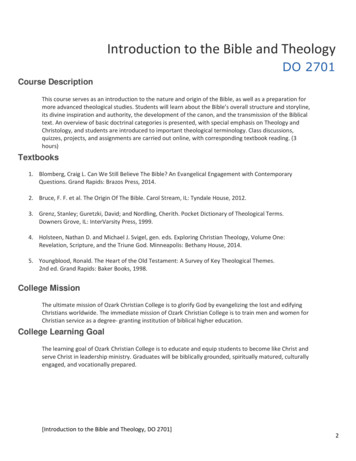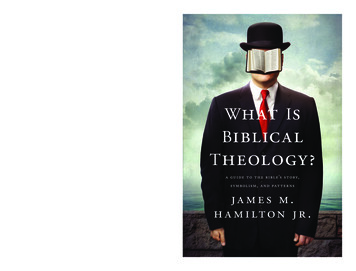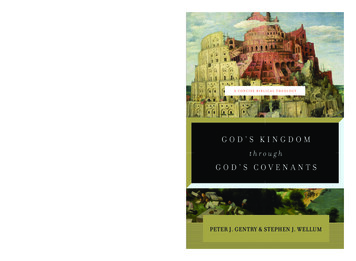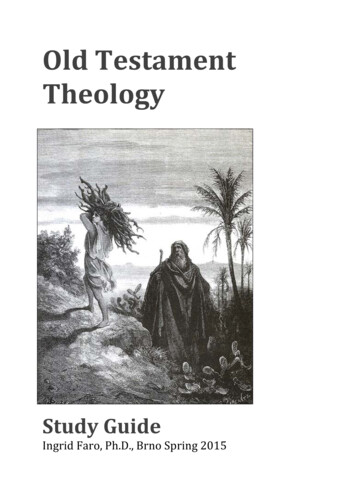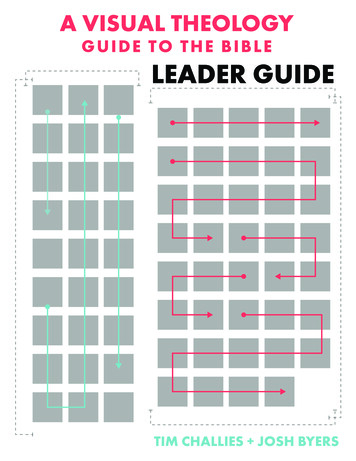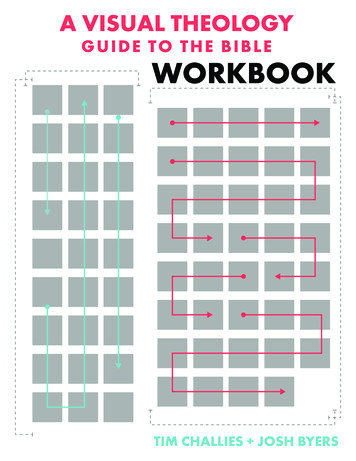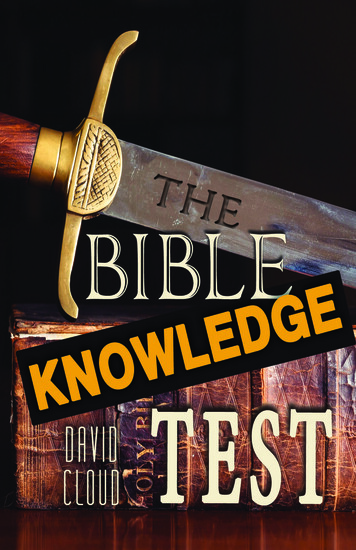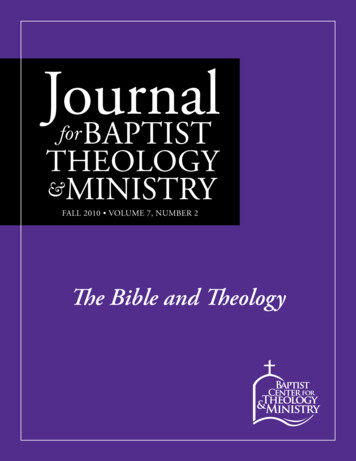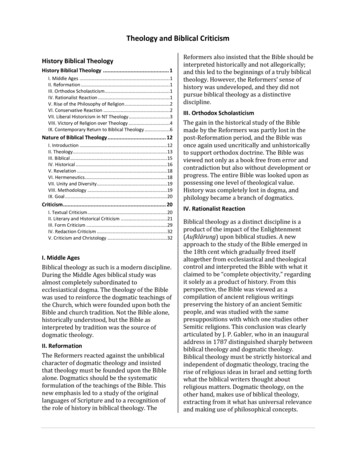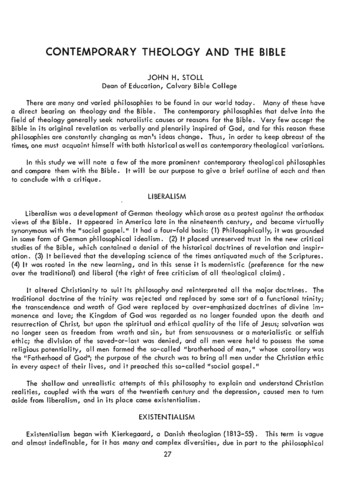
Transcription
CONTEMPORARY THEOLOGY AND THE BIBLEJOHN H. STOLLDean of Education, Calvary Bible CollegeThere are many and varied philosophies to be found in our world today. Many of these havea direct bearing on theology and the Bible. The contemporary philosophies that delve into thefield of theology generally seek naturalistic causes or reasons for the Bible. Very few accept theBible in its original revelation as verbally and plenarily inspired of God, and for this reason thesephilosophies are constantly changing as man1s ideas change. Thus, in order to keep abreast of thetimes, one must acquaint himself with both historical as well as contemporary theological variations.In this study we will note a few of the more prominent contemporary theological philosophiesand compare them with the Bible. It will be our purpose to give a brief outline of each and thento conclude with a critique.LIBERALISMLiberalism was a development of German theology which arose asa protest against the orthodoxviews of the Bible. It appeared in America late in the nineteenth century, and became virtuallysynonymous with the II socia I gospel,lI It had a four-fold basis: (1) Philosophically, it was groundedin some form of German philosophical idealism. (2) It placed unreserved trust in the new criticalstudies of the Bible, which contained a denial of the historical doctrines of revelation and inspiration. (3) It believed that the developing science of the times antiquated much of the Scriptures.(4) It was rooted in the new learning, and in this sense it is modernistic (preference for the newover the traditional) and liberal (the right of free criticism of all theological claims).It altered Christianity to suit its philosophy and reinterpreted all the major doctrines. Thetraditional doctrine of the trinity was rejected and replaced by some sort of a functional trinity;the transcendence and wrath of God were replaced by over-emphasized doctrines of divine immanence and love; the Kingdom of God was regarded as no longer founded upon the death andresurrection of Christ, but upon the spiritual and ethical quality of the life of Jesus; salvation wasno longer seen as freedom from wrath and sin, but from sensuousness or a materialistic or selfishethic; the division of the saved-or-Iost was denied, and all men were held to possess the samereligious potentiality, all men formed the so-called "brotherhood of man, II whose corollary wasthe "Fatherhood of God"; the purpose of the church was to bring all men under the Christian ethicin every aspect of their lives, and it preached this so-called II socia I gospel. IIThe shallow and unrealistic attempts of this philosophy to explain and understand Christianrealities, coupled with the wars of the twentieth century and the depression, caused men to turnaside from liberalism, and in its place came existentialism.EX ISTE N TlA LI SMExistentialism began with Kierkegaard, a Danish theologian (1813-55). This term is vagueand almost indefinable, for it has many and complex diversities, due in part to the philosophical27
28GRACE JOURNALinterpretations of its varied adherents. The broadestdefinition is that it isa realist reaction againstthe shallow optimism and easy rationalism of the nineteenth century liberals. However, it isnaively realist and therefore historicist, and in that it adheres to historical methodology, onemight say it is sti II fundamentally liberal. It follows the tradition that says existence is prior toessence, and indeed all reality is in historical experience, and that essences are only abstractnames. There is no real existence beyond history, either in an ideal or mystic sense above history,or in an eschatological sense at the end of histary.Note how existential theology affects the doctrines of (1) Christology, (2) the Resurrection,(3) the Church, and (4) the Word:(1) The historical Jesus is the Christ, but not in the traditional sense as the personal Lord whosebody was raised from the tomb. Rather, Jesus is the occa ion for the encounter between the crossand the sinner who makes the decision for the ultimate. Apart from this encounter there is no moresignificance to Jesus than any other martyr in history. It is not the Jesus of history that concernsthe existentialist theologian, but the revelation we meet in the moment of decision.(2) The resurrection is redefined to mean not a future life in an incorruptible body in a newheaven or eternal age, but a regenerate life here and now freed from the frustration of death. Although death is inevitable, we do not fear it because we accept it. In other words redemption isnot a future vi ctory, but a present adjustment.(3) The concept of the church is radically changed because of their inwardness of subjectivity.God is always subject; always II Thoull , never II It II . This divine IIThou ll can never be moved, thatis, He can only be spoken to in answer to His call, which comes inwardly. God always treats meas subject too, and never as an object. Thus the relationship between God and man cannot be apprehended bya set of propositions noran emotional experience to be realized bya genuine feeling.The relationship is rather one of speaking and responding to God's Word, hence it is one of decision. But no man can make this decision for another. For most existentialists the church as a visible structure only gets in the way of the decisive conversation between the 11111 and the IIThou. 1IThere seems to be no place for the church, as the body of Christ.(4) The same observation can be made in relation to the Living Word and the Scriptures . Th eexistentialist finds the written Word to be a troublesome obstacle in the way of a decisive de ci sion.As a result the Living Word is separated from the Written Word, and we are left withaut a rule ornorm of authority.Thus the existentialists separate what they call Christ from Jesus, as well as from the church,from the Scriptures, and from the sacraments.Existentialism appears in various forms as propounded by its individual adherents. Thoughthere are many men associated with this phi losophy, and each has added his own paradoxical twistto that which was originally laid down by Kierkegaard, two main forms of existential thought arecurrently flowing in the theological stream. The first is Neo-orthodoxy, which had its beginningswith Karl Barth when he wrote an exposition of Romans in 1919. The other is Bultmannism, whichreceived its name from Rudolph Bultmann, professor at the University of Marburg, in Germany. Ofthe two theories of existentialism, Barth's is the more conservative. The basic line of cleavage
CONTEMPORARY THEOLOGY AND THE BIBLE29between the two stems from their divergent views on the Bible. Though existentialism would ingeneral put the Bible on the periphery of the circle of revelation, and man's experience in himselfin relation to the Christ as the core, Barth would adhere to a more Biblical understanding thanwould Bultmann. The attitude of Bultmann is that the gospel story, in its Biblical setting, is incredible to modern man, for the gospels are mythological in character. He desires to demythologizethe New Testament.The prevailing opinion today is that the philosophy of Bultmann will take over theologicalthought in the coming years, and the Neo-orthodoxy of Barth will decline. It has been said thatGermany today is as nearly Bultmannian as it was Barthian a generation ago, and liberal a halfcentury ago. Let us examine briefly the existentialism of both Barth and Bultmann.The Theology of Karl BarthThe theology of Barth has been characterized as the theology of crisis (the crisis experienceof a person in his own encounter with the Christ), or as dialectical theology (the arriving at thetruth by setting opposites over against each other), or as Neo-orthodoxy (the accepting of thecentral doctrinal formularies of theology since the Protestant Reformation, with a contemporaryformulation and re-interpretation). These phrases are sometimes used interchangeably.Neo-orthodoxy aligns itself with the liberal school of Biblical criticism, and one of the chiefdifferences between it and orthodoxy relates to the Bible. Barth believes that revelation is primarily in Jesus Christ. The Bible, so to speak, is on the periphery of the circle of revelation, andJesus Christ is the center of that circle. The Word is Jesus Christ and the Bible is a witness to theWord. It is therefore.Q word about the Word. Some parts of the Bible are better words about theWord than other parts, but all of it is merely a witness to the Word, Christ.Can we say, then, that the Bible is the Word of God? Yes and no (dialectical theology), inthe sense that it is a word about the Word, and that the Bible becomes the Word of God. Neoorthodoxy says that the text of the Bible is a human product full of errors, but that when God usesit to overpower us, it becomes His Word.Barth says that since the gospel is a witness to the Word, it is a mistake on the part of theorthodox to identify the words of Scripture with the Word of God. It is human to err, and sincethe Bible is a human book with errors, it bears the Word of God to us in a broken and imperfectform. For this reason Neo-orthodoxy accepts some of the higher critical views of Scripture commonly rejected by orthodoxy.One would think that since the Bible is relegated to the periphery of revelation and JesusChrist to the center, that the life of Jesus would have an important place in Neo-orthodoxy. Butsuch is not the case. For the significance of Jesus Christ cannot be in His life, since the recordsof that life are not trustworthy; rather, it lies in His cross. The cross is the revelation of God that011 things in this world are vain and doomed to extinction. The cross is also the sign of the election of all in Christ to life. The cross is thus a symbol of both despair and hope (dialectical theology) The Barthian believes that sin is the mistake of making ourselves the center of things insteadof God. Salvation has to be the work of God in man, for sin can never be overcome by human
30GRACE JOURNALgoodness (which is Biblically true) . This comes about in the following way: first, man despairs;then out of this comes contrition; out of this faith is conceived; and finally in faith is newness oflife and power. Salvation is the shattering or breaking of self, and this may come in a single crisisexperience or in repeated ones. It is significant that Barth's emphasis is on the cross of Christ, andnever on the blood of Christ.Neo-orthodoxy is an attempt to re-interpret traditional or orthodox Christianity in such a wayas to make it more acceptable to the so-called intellectual advance of the day. The critical orliberal approach to the Gospel is modified and synthesized in this system, by an attempt to preachthe orthodox truths while building on the liberal approach to the facts. This is an impossible thingto do.The Theology of Rudolph BultmannBultmann has retreated from the neo-orthodox type of existentialism as propounded by Barth,to an existentialism of his own, in which he attempts to de-mythologize the New Testament. Hisview is that the gospel accounts are largely mythological in content. Bultmann suggests a demythologizing of the New Testament by means of which the mythological elements must be cutaway, such as the myth of apocalyptic cataclysm, the myth of the pre-existent Lord, the futuristicmyth of Heaven, and the historical myths of angels, demons, miracles, the virgin birth, emptytomb, and resurrection. What he has left is the cross, and the gospel of justification by gracethrough fai th.Bultmann contends that the true objective of the gospel message never was to describe supernatural events taking place in space and time, but, rather, that under a mythological garb thestory was intended to announce God's coming to man's soul, or self, and to bring about a radicalchange in a person's existence. When the individual comes to grips with the gospel story he becomes aware of the misery of his " existence", viz., that his self is enslaved by the powers of thisworld, such as worry, sin, and death, and that he is unable to live a life truly his own. Thoughthe gospel story is a myth, through the individual coming to grips with the truthfulness of its meaning, the self is delivered from that tyranny and enabled to live a new life of true spontaneity.That change of " existence" is considered as an act of divine grace, and according to Bultmann itis identical with what the New Testament calls redemption. Yet that result is accomplished bymeans of hearing of the gospel story rather than by any activity of the man Jesus.This in effect amounts to the el imination of the miraculous or supernatural constituents of thescriptural record, since Bultmann adheres to a view of the world asa firmly closed system, governedby fixed natural law, in which there can be no intervention from outside.The rejection by Bultmann of the basic concepts of the Bible mutilates the Christianity of theNew Testament in so radical a manner, that the cross and the gospel of justification by gracethrough faith no longer have any authoritative meaning in the Bible. The stature of Jesus is reducedto that of a mere man. According to Bultmann, the linking of our redemption with God's choiceof an ordinary mortal individual (Jesus), no different from any other man, and of an event (thecrucifixion), in no way miraculous or supernatural, is the real offence of Christianity.
CONTEMPORARY THEOLOGY AND THE BIBLE31ORTHODOXYOrthodoxy is that branch of theology whi ch came to prominence in the church during and afterthe second century. The preservation of Christianity was seen to require the maintenance of orthodoxy against Gnosticism and other trinitarian aberrations. Seventeenth century Protestant theologians stressed the importance of orthodoxy in relation to the soteriology of the reformation creeds.The word "orthodoxy" itself, though not Biblical, expresses the idea that certain statementsaccurate Iy embody the revealed truth- content of Christianity, and are therefore in their own naturenormative for the universal church. The idea is rooted in the New Testament insistence that thegospel has a specific factual and theological content (I Corinthians 15: 1-11; Galatians 1:6-9;I Timothy 6:3; II Timothy 4:3, 4), and that no fellowship exists between those who accept theapostolic standard of Christological teaching and those who deny it (I John 4: 1-3; II John 7-11).Contemporary orthodox views, as opposed to those who hold to liberal or existential views,are seen to be held by two groups in this country known, in a loose sense, as the "Fundamentalists"and the "Evangelicals. 1I These two groups adhere to a set of doctrinal beliefs which are orthodox,and they differ onlyas to the methods of applying their beliefs to contemporary culture. Adherentsof these groups are not of any particular denominational structure, but cut across denominationallines, though there are included within both of these elements various denominations.The basis of this contemporary orthodoxy is embodied in the beliefs of the following "cardinal"doctrines: (1) the inspiration and inerrancy of scripture, (2) the Trinity, (3) the deity and virginbirth of Christ, (4) the creation and fall of man, (5) the substitutionary atonement of Christ, (6)the bodily resurrection and ascension of Christ, (7) the regeneration of believers, (8) the personalreturn of Christ, and (9) the final judgment of all men to eternal blessedness or eternal damnation.Fundamentalists generally hold toa position of separateness from all groups who would hold toany other views than those stated above, while Evangelicals, though believing the same, wouldtake a position of individual preference as to whether or not one should separate from or remain inaffiliation with groups who would not hold these views. Both Fundamentalists and Evangelicalsmaintain a strong testimony to their Christian faith and insistence upon orthodox views.A CRITIQUE OF LIBERALISM AND EXISTENTIALISMliberalism, as such, is dead today because it had within it the seeds of its own decay. Whenthe quest of the liberal Jesus failed, the liberals did not abandon their historical methodology, andhistoricism still dominates the remaining vestiges. The optimism of liberalism collapsed, for it wasexposed by two world wars and the great depression. But out of its collapse there arose a newspirit of our age, that theory known as "existentialism". In that existentialism adheres to an historical methodology one could say that in some respects it is still in the liberal stream of thinking.However, it is a chastened form of liberalism. The neo-orthodox (Barthian) stream takes a moreconservative view than the liberal on the Bible and salvation, while Bultmannism exhibits a radicalform of existentialism in its de-mythologizing of the gospel story. Both aspects of existentialismdo violence to the Bible as the inspired Word of God. Both utilize terminology akin to orthodoxy,but redefine the terms to suit their purposes. Both question the authority of Scripture, and therebyundermine their own systems of theology, for all that we know about sin, salvation, and eternal
GRACE JOURNAL32life, is found in the Bible. Barth criticizes Bultmann for his radical attempts to demythologize theNew Testament, and says that in so doing he projects a real mythology of his own. Yet Barth himself does violence to the Bible in stating that it is only a word about the Word.No true Christian today would minimize the importance of the application of Christ's work.But in existentialism there is a subjectivization which subverts and destroys the gospel. If we dismiss the objectivity of Christ's finished work, it avails us little to make it the sign or theme ofpreaching or understanding. No myth can be the Good News. The Christ of the Bible is thelogos, not the mythos. Christ needs no demythologizing at the hands of human scholars.The mythology of existentialism is the substitution of man-centeredness for Biblical Christ- orGod-centeredness. The existentialist has much to say about God and salvation, but the fact remains that in his philosophyman is still the centerof things. Man declares the nature of the Bible,he demythologizes, he decides the theme, he is the substance and center of the salvation event.Jesus Christ belongs to the periphery.In contrast, the true Gospel is God-centered. God controls it. God is the subject; and thestory, the work, the power, and the glory are His. To put man in the center does not just pervertthe Gospel, it displaces it, and makes it impossible. Existentialism, as well as liberalism, leavesman with nothing--without God, Christ, a Gospel, or faith; with neither true death to sin nor trueresurrection to life.God's Word, the Bible, is His Word for us today. The philosophies of men constantly changeand shift; God's Word to men remains constant, and is lithe same yesterday, today, and forever";and the true message of salvation is still found in the written words of Jesus Christ, "I am the Way,the Truth and the life, no man cometh unto the Father but by me" (John 14:6).* * * * * * * * * *DOCUMENTATION1. Carnell, Edward J., The Case for Orthodox Theology, The Westminster Press, 1959.2. Christianity Today:Vol.Vol.Vol.Vol.3.4.5.6.7.8.II, #3 - G. W. Bromily, "Fundamentalism-Modernism, A First Step."II, #21 - M. o. Mahler, "From Modernism to Conservatism."IV, #21 - R. L. Jaberg, "ls There Room For Fundamentalists?"V, #13 - R. P. Roth,"Christianity and Existentialism."G. W. Bromi Iy, "Dare We Follow Bul tmann?"Harrison, Everett F., ed., Baker's Dictionary Theology, Baker Book House, 1960. Articleson Dialectic, Existentialism, Form Criticism, Fundamentalism, liberalism, Myth, Neo-orthodoxy.Henry, Carl F. H., Evangelical Responsibi lity in Contemporary Theology, Eerdmans PublishingCo., 1957.Ryrie, C.C., Neo-orthodoxy, What!! i!, and What!! Does, Moody Press, 1956.The Sunday School Times:Vol. 102, #47, 48, 49 - O.W. Price,"Can You Trust Christ and Doubt the Bible?"Vol. 103, #3, 4, 5, 6 - J. W. Sanderson, "Fundamentalism and Its Critics."Twentieth Century Encyclopedia 2f Religious Knowledge, Baker Book House, 1955.Two volumes. Articles on Crisis Theology, Dialectical Theology, Existentialism, Form Criticism, liberalism, Myth in the New Testament.VanTil, Cornelius, Has Karl Barth Become Orthodox?, The Presbyterian and Reformed Pub.Co., 1954.
a direct bearing on theology and the Bible. The contemporary philosophies that delve into the field of theology generally seek naturalistic causes or reasons for the Bible. Very few accept the Bible in its original revelation as verbally and

